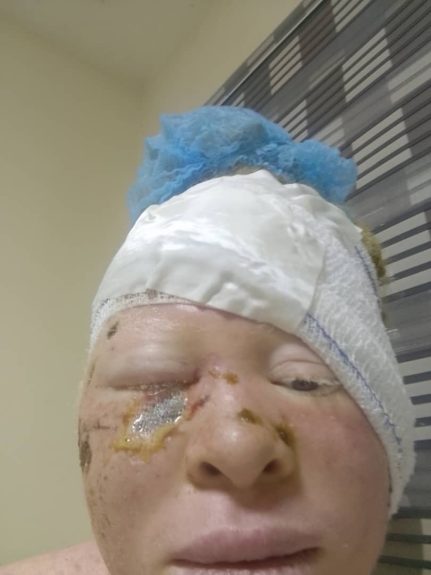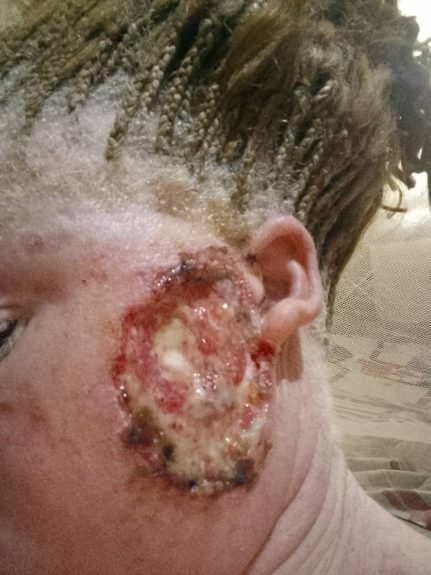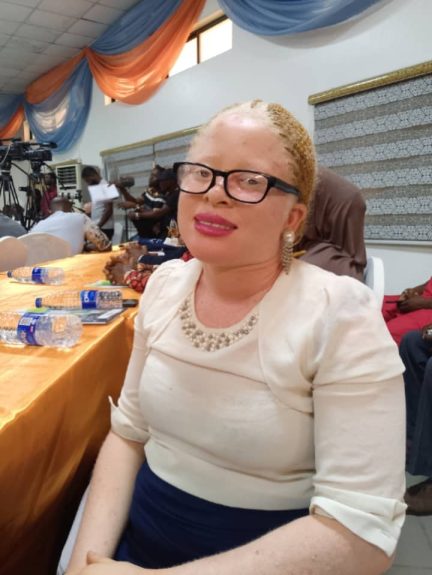
Daniel Otera
When Mrs. Roseline D. Migbole heard the words “stage 2 skin cancer” at the National Hospital, Abuja, in 2024, her world turned upside down. As a woman living with albinism in Nigeria, where the harsh sun and social stigma pose daily challenges, the diagnosis was a terrifying blow.
Yet, through resilience, family support, and grueling treatments in Abuja and Lagos University Teaching Hospital (LUTH), Roseline emerged as a survivor in 2025.
In this heartfelt conversation with The Journal, she shares her journey of pain, hope, and triumph — shedding light on the struggles of persons with albinism (PWAs) facing skin cancer. Her story is not just about survival, but a clarion call for better healthcare, more awareness, and an end to stigma.
Mrs. Migbole, your journey as a skin cancer survivor with albinism is truly inspiring. Can you walk us through what it felt like when you first got your stage 2 skin cancer diagnosis at the National Hospital in Abuja last year?
When I first heard the words “stage 2 skin cancer” at the National Hospital in Abuja, my heart sank. It started with what I thought was a small peel on my skin, like sunburn, nothing serious. I went to a couple of private hospitals, and they kept saying it was just a skin ulcer, giving me antibiotics. But the sore kept growing, and the pain was like fire under my skin. Deep down, I knew something was wrong, but I wasn’t ready for the word “cancer.” When the doctor at National Hospital confirmed it was Stage 2 Squamous Cell Carcinoma after proper tests, it felt like the ground disappeared under me. You hear about cancer, but you never think it’ll be you. I was scared, thinking about my family, and what would happen if I didn’t make it. But I told myself, “Roseline, you’re stronger than this.” I decided to focus on fighting, not on fear. It wasn’t easy, but with God and my loved ones, I found the courage to face it head-on.
Growing up with albinism in Nigeria, how much awareness did you have about skin protection before your diagnosis?
Growing up with albinism in Nigeria is not easy because the sun is very harsh. I always tried to protect my skin the best way I could with hats, long sleeves, and staying out of the sun, but the weather was simply too hot and overwhelming. Despite my efforts, I still experienced challenges. After my cancer diagnosis, however, my approach to skin protection became even more intentional and consistent. Now I don’t take chances at all. I use sunscreen daily, wear wide brimmed hats, long sleeved clothing, and I stay in shaded areas as much as possible. Most importantly, I use my experience to educate other persons with albinism to take protection seriously before it becomes too late.
You had surgery at the National Hospital in Abuja and were referred to LUTH for radiotherapy in 2024. Can you share the highs and lows of navigating these treatments in Nigeria’s healthcare system?
The treatment journey was one of the toughest roads I’ve ever walked. The surgery at National Hospital in Abuja was painful, but it was a relief to know they were cutting out the cancer. The real struggle came with radiotherapy. I was referred to LUTH because it’s one of the few places in Nigeria with a working radiotherapy machine. Enugu has one too, but I didn’t know anyone there, and travelling that far while sick was too much. Private hospitals with machines were charging prices that could buy a car. At LUTH, it was still expensive, around ₦2 million for the whole treatment, and the process was draining. I’d be so weak after each session, sometimes too tired to even eat. The queues at the hospital were long, and the stress of travelling from Nasarawa to Lagos added to the burden. But there were highs too. Some nurses at LUTH were like angels, encouraging me when I felt like giving up. My family, friends, and even strangers who heard my story chipped in to help with costs. Their support, and my faith in God, kept me going. Nigeria’s healthcare system needs serious work, but I’m grateful I made it through.
Skin cancer treatment, like chemotherapy and radiotherapy, can be very expensive. How did you and your family manage the financial burden, especially since free treatment for PWAs was stopped at the National Hospital?
Cancer treatment is extremely expensive in Nigeria. I know of someone with albinism that I met at the National Hospital who had the same SCC but unfortunately died due to financial constraints. Chemotherapy can cost about ₦200,000 per session, and radiotherapy can be from ₦2 million upward.
At some point, the National Hospital Abuja used to offer free skin cancer treatment for persons with albinism, which was a huge relief for many, but sadly that program stopped long before my treatment. Personally, I did not benefit from that free treatment I had to pay for everything myself.
The financial burden was overwhelming, but I was able to pull through with the support of my husband, family members, colleagues, my workplace, my church, and even contributions from some kind-hearted individuals. What made things even more difficult was trying to access the National Health Insurance Scheme (NHIS). The process was very stressful, and imagine going through that while already sick and weak. After all the stress, NHIS only covered about 50% of the cost.
This entire experience showed me how badly our healthcare system needs reform to truly support cancer patients, especially those from vulnerable groups like persons with albinism.
As a survivor, how has your experience with skin cancer changed the way you protect your skin and advocate for others with albinism across Nigeria?
Surviving skin cancer has turned me into a warrior for my skin and for others like me. I now see sun protection as a matter of life and death, no joking matter. I don’t step out without slathering on sunscreen, wearing long sleeves, and putting on a wide-brimmed hat. If I can’t find sunscreen, I beg friends or groups to help me get it. But it’s not just about me anymore I’m on a mission to make sure other PWAs don’t go through what I did. Through groups like the Albino Child Care Foundation and the Advocacy for Women with Disabilities Initiative, I share my story at community meetings, churches, and anywhere I get a chance. I tell people, “Don’t wait for a sore to become cancer. Protect your skin now.” I also push for free sunscreen and protective clothing for PWAs, because not everyone can afford them. My pain has become my purpose I want every PWA in Nigeria to know that with the right steps, they can prevent cancer and live long.
Many PWAs in Nigeria face stigma and rejection, sometimes even from family. Did you experience this, and how did your loved ones support you through your cancer journey?
Stigma is one of the heaviest burdens of living with albinism in Nigeria. I’ve heard it all people saying my albinism was a curse, or that my cancer was some kind of punishment. During my treatment, some people even whispered that I wouldn’t make it, that it was “my portion.” It hurt, but I refused to let those words define me. Thank God for my husband, my rock, who stood by me through every hospital visit and sleepless night. My children, siblings, and friends were my cheerleaders, praying with me, raising money, and reminding me that I was stronger than the disease. My colleagues at work donated funds, and even strangers who heard my story sent help. That love drowned out the stigma and gave me the strength to keep fighting. I know not every PWA is lucky to have this kind of support, and it breaks my heart. That’s why I’m passionate about changing how society sees us. We’re not cursed, we’re human, and we deserve love and respect.


Nigeria has a high burden of skin cancer among PWAs, with many unable to access timely treatment. What do you think the government and hospitals can do to make life better for people like you?
The government and hospitals need to wake up to the reality that skin cancer is killing PWAs because we can’t afford treatment or get it on time. First, they should bring back free treatment programs like the one National Hospital used to have to save lives until it was stopped. NHIS is a good idea, but it’s too stressful and doesn’t cover enough. They need to simplify it and make it cover at least 80% of cancer treatment costs, not just 50%. Hospitals should have fast-track systems for cancer patients, because waiting in long queues when you’re sick is torture. Also, we need more radiotherapy machines across Nigeria, not just in Lagos or Enugu. Most importantly, the government should run campaigns to teach PWAs about skin cancer signs and prevention, like using sunscreen and checking their skin regularly. If they can give free mosquito nets for malaria, why not free sunscreen for PWAs? These steps would save thousands of lives and show that the government cares about us.
Your survival is a beacon of hope for others. What message would you give to young PWAs in Nigeria who are afraid of skin cancer or struggling to get treatment?
To every young PWA out there, I want you to hear this: don’t let fear win. Skin cancer is scary, but it’s not a death sentence if you catch it early. I’m living proof that you can survive. Check your skin every month, look for sores, patches, or anything that doesn’t heal, and run to the hospital if you see it. Don’t wait, thinking it’s just a small thing. Protect yourself every day with sunscreen, hats, and long sleeves, even if people laugh at you. If you’re struggling to get treatment, don’t give up. Talk to your family, community, or groups like the Albino Foundation they can help you find support. Hold on to hope, pray, and keep fighting. I was once in your shoes, scared and weak, but today I’m here, stronger than ever. You can be too. Just take that first step and don’t look back.
The Lagos State Government started a free treatment program for PWAs at LASUTH in 2024. Do you think Nasarawa or other states should follow this example, and how could it help people like you?
The free treatment program at LASUTH in 2024 was a game-changer for PWAs in Lagos. I heard stories of people who got treatment they could never have afforded, and it gave them a second chance at life. Nassarawa, Abuja and every other state in Nigeria should copy this example, no question. In Nassarawa, many PWAs are suffering because they can’t afford hospital bills or even transport to places like LUTH. If our state government started a free treatment program, it would mean that people like me wouldn’t have to beg or sell everything to survive cancer. It would also encourage early detection, because people would know they can get help without breaking the bank. This isn’t just about saving lives, it’s about giving PWAs dignity and hope. I pray other states follow Lagos, because no one should die just because they can’t pay for treatment.

As a proud survivor in 2025, what’s the one thing you want Nigerians to know about living with albinism and fighting skin cancer, and how can we all work together to support PWAs?
As a proud survivor in 2025, I want Nigerians to know that albinism is not a curse, and skin cancer is not the end of the road. With early detection, proper treatment, and support, PWAs can live long, full lives. My journey taught me that we’re stronger than we think, but we can’t do it alone. The government needs to step up with free treatment, affordable sunscreen, and awareness campaigns to teach people about skin cancer risks. Communities must stop the stigma, don’t call us names or push us away; embrace us as your brothers and sisters. For PWAs, we have to take responsibility for our skin use protection, check for changes, and speak up when we need help. Everyone has a role to play: families can support us, churches can raise awareness, and businesses can donate sunscreen or funds. If we all come together, we can make Nigeria a place where PWAs don’t just survive but thrive. That’s my dream, and I’m living proof it’s possible.
